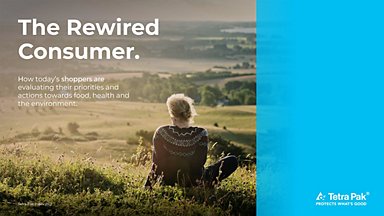Summary and conclusions: The top ten takeaways
- COVID-19 has rewired consumers, pushing them to explore ways to become "a better me", and creating a multitude of new “sticky” habits that look set to last. The personal, economic and environmental fragility we all have experienced during the global pandemic is giving rise to a new mindfulness with a particular focus on health, food protection, the environment and community.
- Food safety is a top priority too, driven by the spotlight the pandemic has shone on health, combined with secure food systems which remains one of the leading concerns for consumers.
- Responsible consumption is a growing trend. Nearly half of respondents believe that every decision they make in their daily lives has an impact on the environment. Consumers are actively mindful of climate- and food-related challenges and want to respond, individually and collectively, in a way that will make a difference.
- This broad trend of caretaking, mindfulness and empathy is global, but is particularly strong among educated women with children, who want to take action and change the status quo.
- The home has been redefined as sanctuary, workplace, classroom, shopping mall and more, significantly shifting daily routines and rituals. With mindful consumers screaming for sustainable, zero-waste ways of living, there are exciting opportunities for food and drink brands to gain relevance by helping those new habits stabilise. The easier to adopt/maintain these lifestyles are, the more likely they are to last.
- Having been denied freedom and choice by the pandemic, consumers want to regain control of their lives in whatever ways they can. They are more proactive, looking for ways to make a difference: in their own lives, including through their choice of diet and ingredients; and in the environment around them, such as by recycling more. We’re also seeing a rise in traditional “back to basics” values, including home cooking, eating with the family and minimising waste.
- Shifting from protecting health to preventing illness is one of the “sticky” trends identified in the report, with consumers increasingly looking for products that meet their emotional and functional needs. In addition, with food perceived as a central component of mental wellbeing, consumers are embracing "guilt-free" snacking. This creates opportunities for brands focusing on “a better me” profile to find a space on post-COVID-19 shopping lists.
- Consumer action to reduce food waste is particularly strong. With greater focus on meal planning, more than 50% of respondents say they are throwing food away less than before the pandemic. Four in five expect they will make the same or a greater effort to avoid throwing away food when pandemic restrictions are removed, topping the list of shifted behaviours.
- The pandemic has made consumers more thoughtful, with greater empathy for others. They have a new appreciation for meaningful connections, with friends and family and beyond – and shared food and beverage experiences often play a key role in making these connections enjoyable and fun.
- Consumers are also more conscious of the need to support wider society, especially their local community, providing opportunities for brands positioning themselves around heritage/local provenance to win loyalty.


